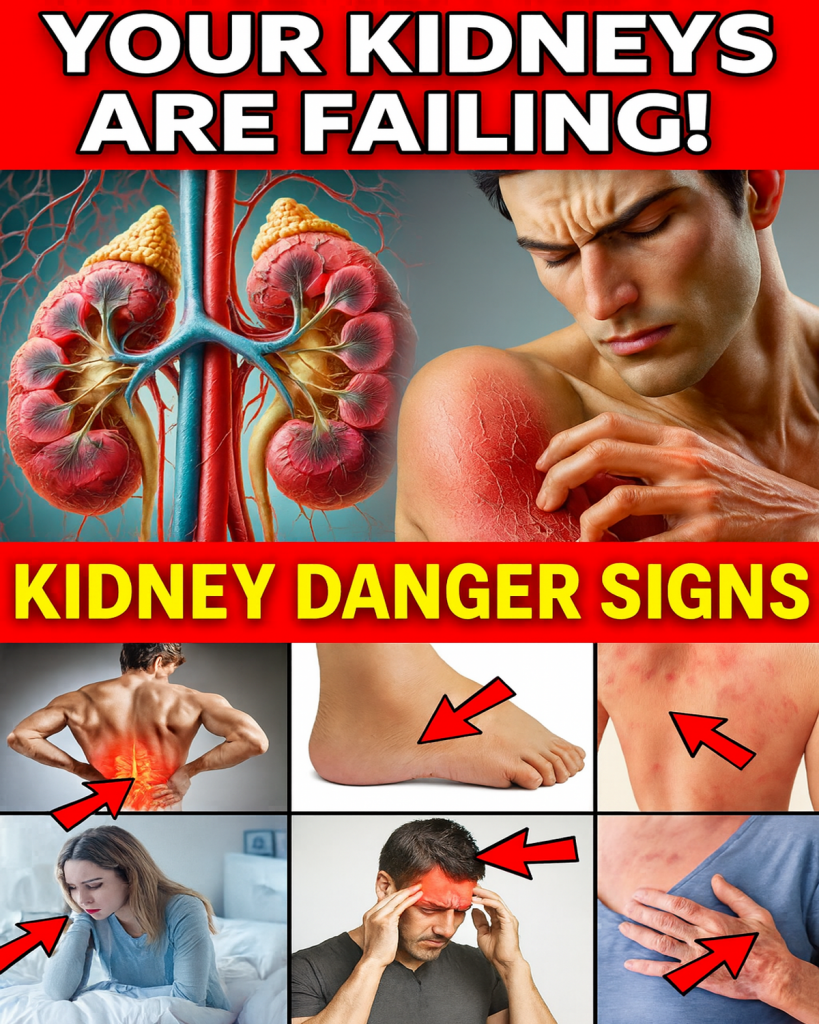Your kidneys work 24/7, quietly filtering more than 50 gallons of blood every single day. They remove toxins, balance electrolytes, and regulate blood pressure. Yet, according to the National Kidney Foundation, nearly 37 million Americans suffer from chronic kidney disease—and most don’t even know it. That’s because early warning signs are often subtle, strange, or dismissed as unrelated issues. Have you ever experienced constant itchy skin, metallic-tasting breath, or unexplained swelling in your ankles? These could be signals from your kidneys. Ignoring them allows damage to progress silently until it becomes severe. In this article, we’ll uncover 23 unusual signs of kidney disease that most people miss. You’ll learn how to recognize them, why they happen, and what you can do to protect your kidney health before it’s too late.

Why Kidney Health Often Gets Overlooked
Kidneys rarely cause obvious pain until advanced disease sets in. That’s why kidney health doesn’t get as much attention as heart or lung conditions. Many symptoms mimic everyday problems like fatigue, headaches, or digestive issues. Understanding the full picture helps you connect the dots.
Key risk factors include:
- Diabetes and high blood pressure.
- Family history of kidney disease.
- Long-term use of certain medications (like NSAIDs).
- Poor hydration and high-salt diets.
With awareness and early lifestyle changes, kidney damage can often be slowed—or even prevented.
23 Strange Signs of Kidney Disease
1–5: Subtle Everyday Changes
- Persistent fatigue – Toxins build up when kidneys can’t filter effectively.
- Brain fog – Difficulty concentrating due to poor oxygen delivery.
- Metallic taste in mouth – Waste buildup alters taste perception.
- Bad breath – Uremia can create a strong ammonia-like odor.
- Unexplained headaches – Related to blood pressure fluctuations.

6–10: Skin and Body Signals
- Dry, itchy skin – Electrolyte imbalances irritate the skin.
- Dark under-eye circles – Linked to poor detoxification and water retention.
- Swelling in hands, feet, or ankles – Fluid retention from impaired filtration.
- Unusual skin rashes – Waste buildup can trigger inflammatory reactions.
- Brittle nails – Mineral deficiencies tied to kidney malfunction.
11–15: Digestive and Appetite Issues
- Nausea without clear cause – Result of toxin buildup.
- Vomiting – More common in later stages of kidney failure.
- Loss of appetite – Waste in blood affects hunger signals.
- Sudden weight loss – Due to malnutrition and poor absorption.
- Frequent hiccups – Rare but linked to uremia.

16–20: Urinary Red Flags
- Foamy urine – Suggests protein leakage (proteinuria).
- Blood in urine – Indicates possible kidney infection or damage.
- Painful urination – Can point to infections spreading to the kidneys.
- Nighttime urination – Kidneys unable to concentrate urine properly.
- Sudden decrease in urine output – May signal advanced failure.
21–23: Overlooked Long-Term Signs
- Shortness of breath – Extra fluid in lungs due to kidney dysfunction.
- Cold hands and feet – Anemia is common with kidney disease.
- Restless legs at night – Mineral imbalance disrupts nerve signals.

| Category | Signs You May Notice | Why It Matters |
|---|---|---|
| Energy & Focus | Fatigue, brain fog | Toxin buildup reduces oxygen delivery |
| Skin & Body | Itching, swelling | Mineral/electrolyte imbalance |
| Digestion & Appetite | Nausea, loss of appetite | Waste overload affects gut |
| Urinary Changes | Foamy or bloody urine | Direct kidney malfunction |
| Long-Term Issues | Shortness of breath, anemia | Advanced kidney stress |
Real-Life Experiences and Case Insights
- Case 1: The Busy Executive
Mark, 42, ignored constant fatigue and swelling in his ankles, assuming it was from long workdays. A routine checkup revealed stage 2 kidney disease. Early lifestyle changes and hydration helped him stabilize his condition. - Case 2: The Grandmother with “Itchy Skin”
Linda, 63, lived with severe itching for years, treating it as an allergy. When she finally sought medical advice, tests confirmed kidney disease. After dietary changes and medical treatment, her symptoms eased significantly.
These stories show how easy it is to overlook signs until damage is advanced.
How to Protect and Support Kidney Health
Nutrition and Hydration
- Stay well-hydrated—water is your kidneys’ best friend.
- Limit excess salt, sugar, and processed foods.
- Eat potassium- and magnesium-rich foods (bananas, leafy greens) in balance.

Lifestyle Habits
- Monitor blood pressure and blood sugar regularly.
- Exercise moderately for circulation and weight control.
- Avoid smoking and limit alcohol.
Preventive Checkups
Regular blood and urine tests can detect kidney problems before symptoms worsen. Look out for:
- eGFR (glomerular filtration rate).
- Urine protein levels.
- Blood pressure readings.
Conclusion
Kidney disease is often called the “silent epidemic” because its warning signs are easy to dismiss. From metallic-tasting breath to swollen ankles and restless legs, your body may already be signaling kidney stress. By recognizing these 23 unusual signs early, you can take preventive steps to protect your kidneys for years to come.
FAQs in brief
- Can kidney disease be reversed? Early stages can often be managed, but advanced stages require medical treatment.
- Do I need medication if I have mild symptoms? Always consult a healthcare provider for proper evaluation.
- Is swelling always kidney-related? No, but it’s an important red flag worth checking.
- What’s the best daily habit for kidney health? Stay hydrated and keep blood pressure under control.
Disclaimer: This article is for informational purposes only and not a substitute for medical advice. Always seek professional guidance for diagnosis or treatment of kidney-related issues.




